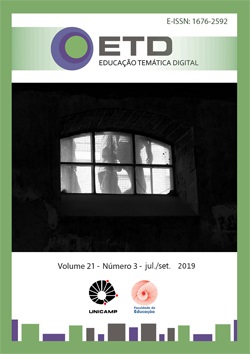Abstract
Mobile technologies have brought about changes in the behavior and habits of children, young people and adults. These changes also happen due to the context of ubiquity. This work deals with a qualitative research of exploratory nature, developed from a case study in a private school in the south of Brazil that uses mobile technologies [tablets] in their pedagogical activities. This article discusses about the game and its playful role in learning from a historical perspective, as well as the objectives of the educational activities, which were supported by the technological didactic resources, the Apps, and which were listed to aid the students in their learning development. Finally, this article also deals with the tessituras of some of the games of Mathematics that were used between 2014 and 2015 and, the organization of the artifacts in the spaces of the school.
References
BENJAMIN, Walter. Reflexões sobre a criança, o brinquedo e a educação. 2a. edição. Tradução: Marcus Vinicius Mazzari. São Paulo: Editora 34, 2009.
BITTENCOURT, João Ricardo; GIRAFFA, Lucia Maria Martins. A utilização dos Role-Playing games digitais no processo de ensino-aprendizagem. PPGCC/PUCRS. 2003. Disponível em: http://www3.pucrs.br/pucrs/files/uni/poa/facin/pos/relatoriostec/tr031.pdf - Acesso em: 20 de nov. de 2016.
BONA, Aline Silva de; FAGUNDES, Lea da Cruz.; , A. Gibi digital: uma atividade de matemática desenvolvida cooperativamente no espaço do Facebook. RENOTE, v. 10, n. 3, 2012.
BROSSEAU, Guy. Introdução ao estudo da teoria das situações didáticas: conteúdos e métodos de ensino. 1a. edição. Tradução: Camila Bogéa. São Paulo: Editora Ática, 2008.
CASTELLS, Manuel. A sociedade em rede. v. 1. São Paulo: Paz e Terra, 2010.
D’AMBRÓSIO, Ubiratan. Educação matemática: da teoria à prática. 23a. edição. Campinas: Editora Papirus, 2014.
DOMINGUES, N.S.; HEITMANN, F.P.; SOBRINHo, G.A.L. Vivências e pesquisas: compondo uma história das tecnologias em 20 anos de GPIMEM. In: Tecnologias Digitais e Educação Matemática. BORBA, M.; CHIARI. A. (Orgs.). São Paulo: Editora Livraria da Física, 2013, p.113-140.
FEIXA, C; LECCARDI, C. O conceito de geração nas teorias sobre juventude. Soc. Estado., Brasília, v. 25, n. 2, 2010, p. 185-204. Disponível em: http://www.scielo.br/scielo.php?script=sci_arttext&pid=S0102-69922010000200003&lng=en&nrm=iso - Acesso em: dez. de 2016.
IBGE. Instituto Brasileiro de Geografia e Estatística. 2014. Disponível em: http://www.ibge.gov.br/home/estatistica/pesquisas/pesquisa_resultados.php?id_pesquisa=40 - Acesso em: dez. de 2016.
JENKINS, H. Cultura da convergência. São Paulo: Aleph, 2008.
GALISI, D. Videogames: ensino superior de jogos no Brasil. In: SANTAELLA, L.; FEITOZA, M. (Orgs.). Mapa do Jogo: a diversidade cultural dos games. Cengage Learning: São Paulo, 2009.
HUIZINGA, J. LUDENS, H. O. M. O. O jogo como elemento da cultura. Trad. João Paulo Monteiro. 4a. impressão. 2000.
KISHIMOTO, T. M. O jogo e a educação infantil. PERSPECTIVA. Florianópolis, UFSC/CED, NUP, n. 22, 1994, p. 105-128. Disponível em: https://periodicos.ufsc.br/index.php/perspectiva/article/viewFile/10745/10260 - Acesso em: mar. de 2017.
LEME, M. I. Silva. Aquisição de conhecimento. Bol. psicol., São Paulo, v. 55, n. 123, 2005, p. 233-239. Disponível em: http://pepsic.bvsalud.org/scielo.php?script=sci_arttext&pid=S0006-59432005000200008&lng=pt&nrm=iso. Acesso em: mar. de 2017.
MOITA, F. G. S. C. et al. Angry Birds como contexto digital educativo para ensino e aprendizagem de conceitos matemáticos: relato de um projeto. SBC–Proceedings of SBGames. 2013. Disponível em: http://www.sbgames.org/sbgames2013/proceedings/cultura/Culture-17_full.pdf - Acesso em: jan. de 2017.
MORAES R., GALIAZZI, M. C. Análise textual discursiva. Juí: Editora Unijuí, 2007.
OSMON, P. Tablets are coming to a school near you. Proceedings of the British Society for Research in Teaching and Learning, v. 31, n. 1, 2011, p. 115-120. Disponível em: http://www.bsrlm.org.uk/wp-content/uploads/2016/02/BSRLM-IP-31-1-20.pdf - Acesso em: dez. de 2016.
ROSA, M. Role playing game eletrônico: uma tecnologia lúdica para aprender e ensinar Matemática. 2004. 184 f. Dissertação (Mestrado em Educação Matemática) –UNESP–Universidade Estadual Paulista. Instituto de Geociências e Ciências Exatas. São Paulo, Rio Claro. Disponível em: http://repositorio.unesp.br/bitstream/handle/11449/91089/rosa_m_me_rcla.pdf?sequence=1 - Acesso em: fev. de 2017.
SANTAELLA, L. Comunicação ubíqua: repercussões na cultura e na educação. São Paulo: Paulus, 2013.
SIMÃO, J. P. S. et al. Games educacionais baseados em experimentação remota móvel. Revista Técnico Científica do IFSC, v. 1, n. 5, 2013, p. 192.
, A. Gui@ de aplicativos para educação básica: uma investigação associada ao uso de tablets. In: XVII Encontro Nacional de Didática e Prática de Ensino da ENDIPE, v. 1, n. 1, 2014, p. 1-12.
, A. Aplic@ tivos para tablets: educar para e com as tecnologias digitais. RENOTE, v. 13, n. 1, 2015.
, A. Aplic@tivos como recurso didático tecnológicos: reflexões para a formação e prática docente. In: XVIII Encontro Nacional de Didática e Prática de Ensino da ENDIPE, v. 1, n. 1, 2016, p. 1-12.
, A.; GIRAFFA, L. M. M. Guia de orientações didáticas para tablets: tessituras do Design Instrucional. Educação Por Escrito, v. 6, n. 2, 2015, p. 238-254.
WEISER, M. The computer for the 21st century. Scientific American, v. 265, n. 3, 1991, p. 94-104. Disponível em: https://www.ics.uci.edu/~corps/phaseii/Weiser-Computer21stCentury-SciAm.pdf - Acesso em: dez. de 2016.
The ETD - Digital Thematic Education uses the Creative Commons license (CC), thus preserving the integrity of the articles in an open access environment.

